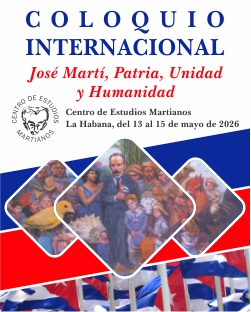 Several days ago, when I was asked to address you in English to introduce José Martí, his life, his works and his historical scenario to you, without which much of his prose would remain confusing, I thought it could be more fitting, due to lack of practice of my spoken language, to put a few notes with my reflections in writing, including, in addition to the basic facts of his life, at least part of my own research in the Critical Edition of his Complete Works, an effort that I hope will make it worth your time – and mine. A basic perspective of his life, will hopefully help you understand the complexities of his revolutionary tasks in the expiring days of the nineteenth century and the importance of this exceptional human being ´s life for present day Cubans.
Several days ago, when I was asked to address you in English to introduce José Martí, his life, his works and his historical scenario to you, without which much of his prose would remain confusing, I thought it could be more fitting, due to lack of practice of my spoken language, to put a few notes with my reflections in writing, including, in addition to the basic facts of his life, at least part of my own research in the Critical Edition of his Complete Works, an effort that I hope will make it worth your time – and mine. A basic perspective of his life, will hopefully help you understand the complexities of his revolutionary tasks in the expiring days of the nineteenth century and the importance of this exceptional human being ´s life for present day Cubans.
As you may know, he was born in Havana on January 28, 1853 in a modest Spanish family then living in the capital city of the Island. His father, born in Valencia, Spain, was a Sargent in the artillery corps of the Spanish Army, reaching in later days the rank of liutenant of Infantry. His mother was a simple Spanish housewife born in the Canary Islands, a colony of Spain off the coast of Africa.
It has always been a mystery to many of us how early in his life Martí began showing his creative potential, his literary genious, his capacity for political analysis and strategic thought, and above all his his ethical principles and sense of social justice. When he was just nine years old, he accompanied his father, designated district judge in Hanábana in what is today Las Villas province, then a hotbed of illegal infiltration of slaves from Africa. Already proficient in his written Spanish, Martí helped his father, ? too busy trying to supress, without the basic means to back his authority, the illegal slave trade in accordance with a treaty signed with the british government?, as a scribe for the official paperwork. There he witnessed the horrors of slavery. Years later he wrote in his personal notebook: “What human being who has seen a black man being flogged does not consider himself with him forever in debt? I saw him when still a child, and the shame is still vivid in my memory […]. I saw him, and from then on I swore to myself I would always defend him ”.
He was, in short, gifted with exceptional human qualities. When he died at 42 he bequeathed us twenty-eight volumes of essays, articles, poetry, drama, letters and novels, forerunners of modernism, thought to be by the greatest writers and critics of his time and ours among the best created in the Spanish language, a veritable treasure of knowledge we are doing our best to preserve for future generations.






